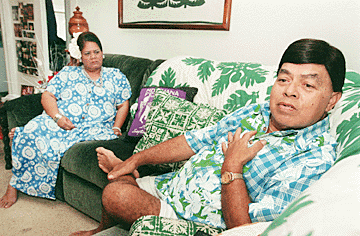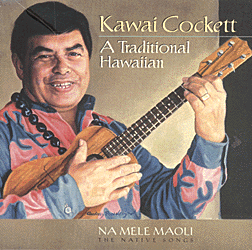


Since retiring last year,
By John Berger
Kawai Cockett has been
busier than ever
Special to the Star-BulletinKAWAI Cockett officially retired last fall but it's hard to tell that from his schedule. He released his first album in five years, "Na Mele Maoli," and is sharing his knowledge of Hawaiian language and culture with elementary school students at Aliiolani and with kindergarteners at Lunalilo Elementary.
"I never thought I could work with the younger ones but they're always anxious to learn. When I hear them mimic exactly the way that I'm singing to them, it's the same way I learned from my kupuna."
Listening to Cockett share his views on Hawaiian culture is an arresting experience. He speaks English with stately dignity, but confesses when prompted by his wife that he feels more comfortable speaking Hawaiian. Talk with him for a longer period of time and he begins expressing himself first in Hawaiian, then translating his sentiments into fluent English.

"When I went to school, I had very hard time because I grew up with my grandparents and all they spoke was Hawaiian. When I went to school the first two years I stayed back one year because I had a hard time speaking English. They finally told me that I must learn English, (because) this is the way of life. There were was about 15 of us learning English."Cockett was born in Molokai and raised as the hanai son of his father's cousin. He speaks fondly of time spent working the taro lo'i, fishing and crabbing, picking and cleaning limu, collecting fruit in season, and gathering wood for the family stove. Music was an important part of his life.
"Music was always something that I loved, and I loved to play ukulele. My stepdad at the time always wanted me to listen to chants and Hawaiian music so I learned by listening.
"It was nothing that was given to me, I had to take in myself. He would do it two or three times and then after that he would tell me to do it. The way that I sing today comes from that."
Lack of transportation almost prevented Cockett from finishing high school. An opening at the Molokai High dorm enabled him to graduate. He moved to Oahu in 1957 and continued his musical education with John Kamealoha Almeida, Alice Namakelua and Pauline Kekahuna. Forty years later he is a kupuna and treasured cultural resource in his own right.
"I sing classical Hawaiian (music). It is my love, my aloha, my mana, and I thank my grandparents (and) all of those who guided me. They taught me that if you're going play Hawaiian music you play it with the heart and you play it with feeling.
"You strum, you get that rhythm and everything, and it comes from within your na'au, your bowels, through your heart and you bring it out with your voice. I've held on to what I've learned and stayed that way."
"As I look to the music today and hear the new up-and-coming (performers) of today I feel sad for a lot of them because they do not have kupuna or people around to teach them the legacy of Hawaii of before as I had. I'm so grateful that I was brought up that way."

‘Na Mele’ a
perfect meshNa Mele Maoli
By Kawai Cockett
Hula records
Cockett is a distinctly talented vocalist. He has never sounded better. The clean acoustic arrangements compliment his voice. The interplay between pianist Eddie Ogawa and the rhythm section is particularly nice. So is the absence of synthetic filler and faux string sections.
Detailed liner notes make this album an excellent introduction to Cockett and the traditions embodied in his music. The annotation includes the Hawaiian lyrics, attributed English translations, information on the cultural significance of each song, Cockett's discography and biography.
The kaona (hidden meanings) within the lyrics remain veiled for those who earn access to them through careful study of language and culture.
Click for online
calendars and events.